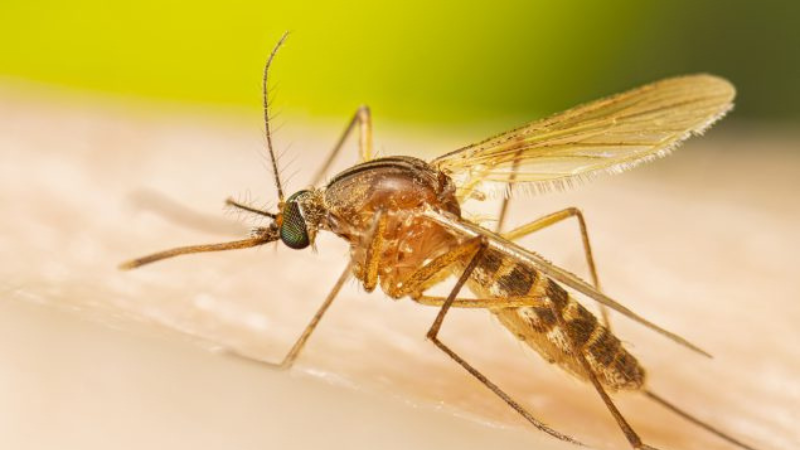Daily News
First West Nile Virus Found in Cincinnati Area in 2025
July 1, 2025

CINCINNATI – July 1, 2025 – A mosquito collected in Madisonville has tested positive for West Nile virus. This was the first confirmed detection in Cincinnati this year.
The Cincinnati Health Department (CHD) is urging residents to take immediate, simple actions to protect themselves, their families, and their neighborhoods from mosquito-borne illness.
“West Nile virus can spread to humans through mosquito bites, and we’ve just confirmed it’s here in the local mosquito population,” said Grant Mussman, MD, MHSA, Cincinnati Health Department Commissioner. “Fortunately, the steps you can take to prevent infection are straightforward and effective, like dumping standing water and wearing repellant, especially at dawn and dusk. We want to make sure people know what to do, and do it now.”
Through its regular and ongoing surveillance for mosquito-borne diseases, CHD collects mosquito samples throughout the city to test for the West Nile virus and other mosquito-borne diseases.
Neighborhood mosquito samples are tested on a rotating basis, and CHD urges all city residents to act now to reduce mosquito breeding areas.
Once a positive sample has been identified, CHD’s Technical Environmental Services (TES) team contacts nearby residents informing them that mosquitoes that tested positive for the West Nile virus were found in the area and providing information on how they can protect themselves.
In 2024, the city of Cincinnati had 24 West Nile virus positive mosquito pools, far above the average of six positive pools in the past 10 years. However, no human infections were diagnosed. The last confirmed case of West Nile virus infection of a Cincinnati resident was in 2015.
According to the Centers for Disease Control and Prevention (CDC), “The West Nile virus is the leading cause of mosquito-borne disease in the continental United States. It is most commonly spread to people by the bite of an infected mosquito. Cases of West Nile occur during mosquito season, which starts in the summer and continues through fall.”
There are several things that can be done to help prevent mosquitoes from breeding near homes and to protect people from mosquito bites.
Controlling Breeding Sites:
- Because mosquitoes breed in stagnant water and can do so even in a very small quantity of water, remove any possible breeding areas where mosquitoes could lay eggs.
- Eliminate sources of standing water in your yard such as saucers under flowerpots, children’s toys, wheelbarrows, boats, tires, puddles, etc.
- Replace water in bird baths and outdoor pet dishes at least every week to help eliminate stagnant water.
- Keep the swimming pool circulating, clean and chlorinated, and remove any water that collects on the swimming pool cover.
- Empty out and turn over plastic wading pools or kiddie pools when not in use.
- Keep gutters clean to prevent standing water.
Protecting Yourself:
During mosquito season (May through September for most of the U.S.), limit outdoor activities as much as possible at dusk and dawn, when mosquitoes are the most active. Wear light-colored, loose-fitting pants and long-sleeved shirts, as well as shoes and socks when outdoors for long periods of time, or when mosquitoes are most active.
- Use an EPA-approved mosquito repellent to protect exposed skin. Follow label directions when applying to yourself or your children (https://www.epa.gov/insect-repellents).
- Place BTi (Bacillus thuringiensis israelensis) briquettes such as Mosquito Dunks® in standing water that cannot be drained. BTi is lethal to mosquito larvae but considered safe for humans, other animals, and aquatic life. It can provide protection for up to 30 days and can be purchased at many hardware stores or gardening centers.
- Repair or replace old and torn screens in doors, windows, and vents.
- If using insect spray on property or yard, be sure to follow label directions carefully.
- For questions or more information regarding West Nile virus or mosquitoes, contact the Cincinnati Health Department’s Technical Environmental Services Unit at 513-352-2922.
Conducting surveillance helps CHD and the Ohio Department of Health (ODH) keep track of the virus so that necessary steps are taken if it becomes a significant threat.
About the West Nile virus:
The incubation period for the West Nile virus, for which there is no vaccine, is usually two to six days but ranges from two to 14 days. Most people (70%-80%) who become infected will show no symptoms. About one in five people who are infected will develop a fever and other symptoms such as headache, body aches, joint pains, vomiting, diarrhea, or rash. Most people with this type of West Nile virus disease recover completely.
Finally, less than 1% of people (about one in 150) who are infected will develop a serious neurologic illness such as encephalitis or meningitis (inflammation of the brain or surrounding tissues). The symptoms of neurologic illness can include headache, high fever, neck stiffness, disorientation, coma, tremors, seizures, or paralysis. Recovery from severe disease may take several weeks or months. Some of the neurologic effects may be permanent. About 10% of people who develop neurologic infection due to West Nile virus will die.
For more information about the West Nile virus, visit CDC’s website (www.cdc.gov/westnile) or ODH’s website (www.odh.ohio.gov/wnv).
